|

A French inventor, Antoine Bovis, in the 1930’s visited the
Great
Pyramid of Giza. In the King’s chamber, he noticed a dead cat and a
mouse that happened some time before to enter the pyramid. He
noticed these animals showed no signs of decay, and were in fact
dehydrated and appeared mummified. Back in France, he decided to
build some cardboard model pyramids and experiment. He realized
orientation was important and oriented his model pyramids in the
North South direction, exactly like the Great Pyramid. He placed a
small stand under the pyramid one-third the way up, just like the
location of the King’s Chamber in the Great Pyramid. He placed raw
meat on this platform and left it for several days. During that
time, it should have become rotten, but when he checked it, he
noticed it was dehydrated without rotting. Thus we have one of the
first modern experiments on pyramid power.
It has been reported that John Hall from the United States in
1935
similarly carried out experiments with model pyramids. Also, using a
copper ring and wires, he showed that an electric charge was emitted
from the apex of the model pyramid.
In the 1940’s, Karl Drbal, a Czech radio technician, read about
Bovis’s experiments. He repeated many of them and got the same
results. He was the first to try placing a razor blade in the model
pyramid 1/3 the way up and than examine it. He discovered that dull
razor blades become sharpened in the pyramid and instead of only
getting a few shaves out of them; you could actually get 50 or more
shaves since the pyramid keep sharpening them. He applied for a
patent for his model pyramid. He received it in 1959 and it was for
maintaining the sharpness of razor blades and razor knives. The
cutting edge of the razor blade had to be oriented in the
North-South direction.
Years later, a brilliant researcher in the United States, Dr.
Patrick Flanagan, also undertook experiments with pyramids. As one
of the first people to scientifically study Pyramid Power, he
published the first book on this subject in 1973 called “Pyramid
Power”.
He wanted to identify the energy that was
emitted, or produced, by objects, which had the pyramid shape. (He
has been to Egypt over 30 times.) He believed there was energy
coming from the pyramid and called this energy “Biocosmic Energy.”
He also verified the experiments of Bovis and Drbal, and showed that
raw meat placed in model pyramids would not rot but became
desiccated and mummified. Dr. Flanagan believed that this energy has
its greatest concentration in the King’s Chamber (see chapter 14
about radioactivity levels in this chamber), which is located about
1/3 of the way up to the top of the pyramid.
Other shapes he
researched did not produce the exact same energy effect. Thus the
pyramids unique shape was the cause of Biocosmic Energy. Flanagan
continues to investigate the effect of pyramids, and his research
has also focused on electromagnetic energy, Kirlian photography, and
other techniques to investigate this energy. He goes down in history
as one of the first researchers to scientifically explore this
field.
More recently, Dr. Krasnoholvet’s from the Ukraine has continued
researching pyramid power, and actually did electron microscope
scans of the razor blade experiment and claims to have identified
this pyramid energy field (see chapter 11).
Also as was shown in Chapters 10 and 11, the Russian and Ukrainian
research have demonstrated that pyramids can affect animate and
inanimate objects. The Russian research shows the health benefits
that pyramids produce, as they can also affect the mental states of
individuals.
Joe Parr (see chapter 12) and Dan Davidson, have also preliminary
data that the pyramid shape can cause changes in brain function.
A Canadian researcher and inventor, Edward Gorouvein, formerly from
Russia, has worked with Alexander Golod for many years and is
developing pyramid products to try to utilize this energy field that
the Russian pyramids are producing. He has had much success working
with health clinics and practitioners in Canada and in applying his
ideas and products. Currently he is working with architects to
design and develop pyramid houses based on the Russian Pyramids.
On some statues and drawings of the Pharaohs in ancient Egypt, they
can be seen holding long cylindrical rods in their hands. No one
really knows for sure what these rods are or their purpose. Russian
researchers Svetlana and Sergey Gorbunovy have researched old
records and manuscripts and have reproduced what they believe these
rods were originally made of and what their purpose was. The Rods
they manufacture are hollow cylinders made of copper (for the right
hand) and of zinc (for the left hand) with special fillings inserted
for each type. Before being placed in the Rods, these fillings are
placed for 12 days in the 22-meter Russian Pyramid. This supposedly
provides molecular and energetic enhancement. Many people have used
these Rods for medical and spiritual attunement and they are very
popular in the alternative health fields in Russia. People have
claimed that working with these Rods enhances memory, intuition, the
immune system, and reduces stress and fatigue. This is a very unique
product since it takes into account ancient Egypt and the effect of
the Russian Pyramids.
Kirti Betai, a pyramid research and health practitioner from India,
has used pyramid structures to treat over 50,000 patients in the
last 10 years. He claims that the Great Pyramid, and other Pyramids
built across the world were designed and developed to insulate the
mummified body, etc. from the interactions with surrounding
environment and thereby prevent decay. Every energy interaction will
lead to some change, adverse or favorable; and since energy
interactions are spontaneous and continuous, change is the only
constant in this part of the creation. The pyramid shape behaves
like an antenna, which attracts, accumulates, and accelerates energy
particles from its energy environment.
Just like Television and
Radio antennas, which are made from similar materials, attract
different signals because of their different and unique geometric
shapes. Pyramids made from different materials or in different
geometric shapes and sizes attract different energy particles from
their energy environments, and therefore would have different
properties. Pyramids made from the same material, of the same size
and shape, erected at different places will acquire different energy
fields, and because their energy environment is different, these
fields would have different properties.
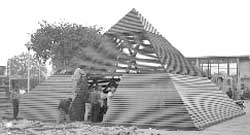
One of the Pyramids used by Kirti Betai
The common thread is that all these researchers have shown that the
pyramid shape has tangible, and often measurable effect on humans,
both physically and mentally. It is also known that people have
claimed to have subjective beneficial effects by meditating under
and near pyramid shapes. Also, some have claimed that pyramids can
produce altered states of consciousness and out of the body
experiences. These claims need to be carefully verified
scientifically, but it appears that this is almost a universal
phenomenon, and it seems likely that the ancients were aware of this
effect.
There are several important large contemporary pyramid structures
that have been built around the world. One of the largest and most
interesting is the one at the Osho Meditation Resort in Pune, India,
which just opened in November of 2002. This very large pyramid was
constructed specifically for meditation purposes. It can hold over
5000 people, and it was designed by an Indian mystic and spiritual
teacher, known as Osho who died in the 1990’s and gave instructions
for it to be built after his death.
He wanted this building
constructed especially to be used for meditation purposes. It is
very interesting that many spiritual teachers and mystics from India
have always acknowledged the power of the pyramid shape for
meditation. This is the largest complex in the world today
constructed specifically for meditation. This pyramid is
approximately 9 stories high (about 40m) and is composed of steel
and concrete. It took about 4 years to complete.
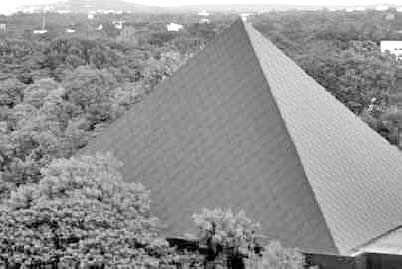
The Meditation Halls at the Osho Commune to duplicate the three
pyramids at the Giza Plateau
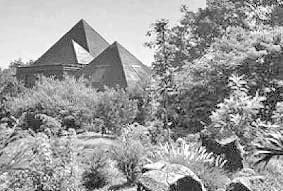
In May of 2003, there was an article, “Le tre piramidi di
Montevecchia” by Cinzia Montagna, on an Italian Web site (www.lombardiainrete.it)
of the discovery of three ancient pyramids from a satellite image in
northern Italy, in the town of Montevecchia.
They looked like hills
since they are covered with vegetation and appear to be 500 feet
high and made of stone. Their slopes are about 42 degrees and appear
to be aligned with the constellation Orion by matching the three
stars in Orion’s belt. The age has not yet been determined but
initial assessments put the age over 3000 years. It will be
interesting to see what these pyramids may reveal as they are
uncovered and explored.

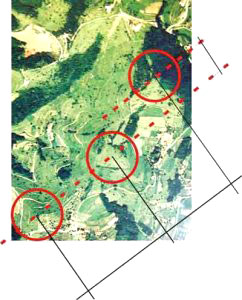
Location of the 3 pyramids
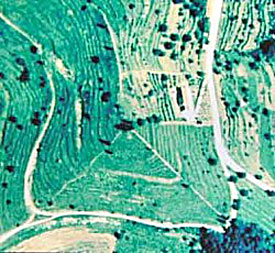
One of the pyramids from the air
Besides the well known Egyptian and Mexican Pyramids,
other ancient
pyramids are being discovered all over the world.
Since Pyramid Power in modern times was first observed and studied
in the 1930’s, researchers continue to the present day to learn more
about this mysterious energy. Maybe it is not as mysterious as
before, since science is having success in quantifying and
identifying its inherent energies. We do not have the absolute
answer to what it is yet, but I think we are coming ever closer.
With the continuing work of the Russian and Ukrainian researchers,
more is bound to be revealed.
So, we can see that Pyramids have been used in many different ways
throughout recorded times. Also, we have been moving to a more
scientific approach to studying the effect of pyramids using modern
technology to unravel their mysteries.
REFERENCES
-
Begich, Nick, Towards a New Alchemy, 1996
-
Brennan, Herbie, The Secret History of Ancient Egypt, 2001
-
Flanagan, Pat, Pyramid Power, 1973
-
Flanagan, Pat, Beyond Pyramid Power, 1976
-
Flanagan, Pat, The Pyramid and Its Relationship to Biocosmic Energy,
1971
-
Valentine, Tom, The Great Pyramid: Man’s Monument to Man, 1975
-
Von Daniken, Erich, The Eyes of the Sphinx, 1996
|






